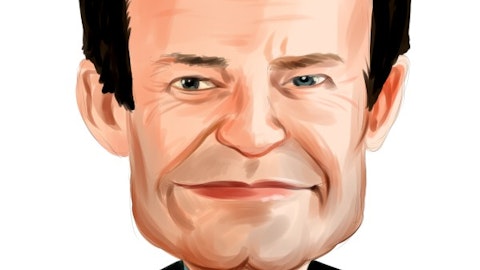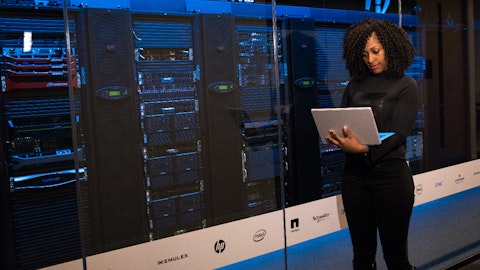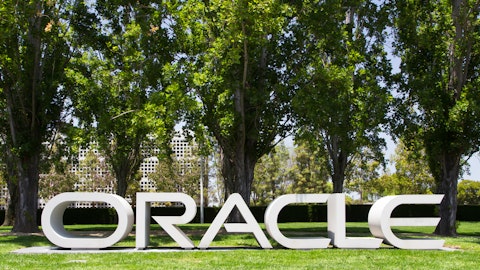It’s all industries. As some of you know, auto companies are doing their simulations with us. It’s really across industries, across sizes. It’s very, very diversified. Larry, I don’t know if you have additional comments.
Larry Ellison: Yes, maybe the most interesting industry that’s adopting the Oracle Cloud are people who are in the technology business. So a lot of our customers are, I mean, their business, I mean, Zoom, in the early days of Oracle, it wasn’t long ago we were talking about Zoom and still very excited about Zoom. And they came to us, one of our earliest, very, very large customers. And a lot of their business is just running an app, if you will, an application on the cloud. And a huge amount of their expense is running that application in the cloud and doing it efficiently. And where we’re most obvious, I mean, NVIDIA is an extraordinary company, but Cohere is a great company. But a lot of their expense is running AI training in the cloud.
And when it’s that much of your expense, if we’re a lot faster, they do a lot of due diligence about the technology. And it became very apparent, a lot of the early adopters, if you will, and we’re still in the early stages, a lot of the early adopters at scale of the Oracle Cloud were highly technical companies like a Zoom or an NVIDIA, I can name a bunch of others, or a highly technical industry like phone companies, telecommunication companies, where they see the advantages, not only, by the way, the performance and cost advantages. Another thing that we’re very proud of is because of our network, we’re highly reliable. And because of the autonomy, we’re highly reliable. If, for example, the Oracle Autonomous Database doesn’t lose your data, because you can’t make a pilot.
Usually a lot of the data loss is caused by pilot error. Well, with the Oracle Autonomous Database, the driver is the system. It’s a self-driving database. So you can’t make a human error that causes you to lose data. So it’s very, where a phone company has to be up 24 hours a day, where a bank really is not supposed to lose your data, where a huge percentage of your expenses are your own cloud expenses, and your technology company delivering technology services from somebody else’s cloud. In those areas is where we’ve seen adoption of Oracle at scale. And the less technical companies are now beginning their journey of looking more closely at the Oracle cloud. And when they do look closely, we compare very favorably with the other clouds.
Mark Moerdler: That’s very helpful. I really appreciate it.
Operator: And we’ll take the last question from Kirk Materne of Evercore ISI.
Kirk Materne: Hi, thanks very much. Just a quick one for Safra, if I could. Safra, obviously, a very strong free cash flow quarter. We’ve gotten some questions from investors wondering about the CapEx this quarter, where you saw some efficiencies, how you’re able to keep CapEx flat going into next year, given the fact that you’re going to seeing this great demand for OCI. So could you double click on that a little bit for us? Thanks.
Safra Catz: Yes. I mean, this past year was a big CapEx number as compared to usual. And we put out a lot of capacity. It is getting filled up, and getting used up. And I think we’re getting real economies. In addition, one of the things you don’t realize is that our underlying infrastructure, for example, I’ll give you one example, our underlying infrastructure becomes more and more efficient, even under the best example actually is under Fusion. As we move, as we’ve moved to OCI, we are also moving to Autonomous Database Serverless, which again gives us added capacity. So we’re constantly, constantly becoming more efficient. Our original landing was 12 racks. We’re moving to 10 racks to have all the services. We’re just continuing to sort of miniaturize our capabilities and it’s giving us enormous efficiencies and cost savings.





